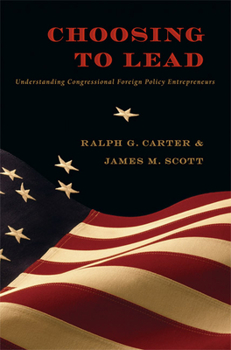Choosing to Lead: Understanding Congressional Foreign Policy Entrepreneurs
Select Format
Select Condition 
Book Overview
Shedding new light on how U.S. foreign policy is made, Ralph G. Carter and James M. Scott focus on "congressional foreign policy entrepreneurs," the often unrecognized representatives and senators who take action on foreign policy matters rather than waiting for the executive branch to do so. These proactive members of Congress have undertaken many initiatives, including reaching out to Franco's Spain, promoting d tente with the Soviet Union, proposing the return of the Panama Canal, seeking to ban military aid to Pinochet's regime in Chile, pushing for military intervention in Haiti, and championing the recognition of Vietnam. In Choosing to Lead, Carter and Scott examine the characteristics, activities, and impact of foreign policy entrepreneurs since the end of the Second World War. In so doing, they show not only that individual members of Congress have long influenced the U.S. foreign policy-making process, but also that the number of foreign policy entrepreneurs has grown over time.
Carter and Scott combine extensive quantitative analysis, interviews with members of Congress and their staff, and case studies of key foreign policy entrepreneurs, including Frank Church, William Fulbright, Jesse Helms, Edward Kennedy, Pat McCarran, and Curt Weldon. Drawing on their empirical data, the authors identify the key variables in foreign policy entrepreneurship, including membership in the Senate or House, seniority and committee assignments, majority or minority party status, choice of foreign policy issues, and the means used to influence policy. By illuminating the roles and impact of individual members of Congress, Carter and Scott contribute to a more nuanced understanding of the broader U.S. foreign policy-making process.
Format:Paperback
Language:English
ISBN:082234503X
ISBN13:9780822345039
Release Date:July 2009
Publisher:Duke University Press
Length:312 Pages
Weight:1.15 lbs.
Dimensions:0.8" x 6.1" x 9.1"
Customer Reviews
0 rating





